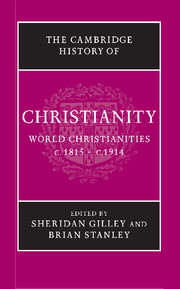Book contents
- Frontmatter
- 1 Introduction
- PART I CHRISTIANITY AND MODERNITY
- PART II THE CHURCHES AND NATIONAL IDENTITIES
- PART III THE EXPANSION OF CHRISTIANITY
- 26 African-American Christianity
- 27 Christian missions, antislavery and the claims of humanity, c.1813–1873
- 28 The Middle East: western missions and the Eastern churches, Islam and Judaism
- 29 Christians and religious traditions in the Indian empire
- 30 Christianity in East Asia: China, Korea and Japan
- 31 Christianity in Indochina
- 32 Christianity as church and story and the birth of the Filipino nation in the nineteenth century
- 33 Christianity in Australasia and the Pacific
- 34 Missions and empire, c.1873–1914
- 35 Ethiopianism and the roots of modern African Christianity
- 36 The outlook for Christianity in 1914
- Select General Bibliography
- Chapter Bibliography
- Index
- References
36 - The outlook for Christianity in 1914
from PART III - THE EXPANSION OF CHRISTIANITY
Published online by Cambridge University Press: 28 March 2008
- Frontmatter
- 1 Introduction
- PART I CHRISTIANITY AND MODERNITY
- PART II THE CHURCHES AND NATIONAL IDENTITIES
- PART III THE EXPANSION OF CHRISTIANITY
- 26 African-American Christianity
- 27 Christian missions, antislavery and the claims of humanity, c.1813–1873
- 28 The Middle East: western missions and the Eastern churches, Islam and Judaism
- 29 Christians and religious traditions in the Indian empire
- 30 Christianity in East Asia: China, Korea and Japan
- 31 Christianity in Indochina
- 32 Christianity as church and story and the birth of the Filipino nation in the nineteenth century
- 33 Christianity in Australasia and the Pacific
- 34 Missions and empire, c.1873–1914
- 35 Ethiopianism and the roots of modern African Christianity
- 36 The outlook for Christianity in 1914
- Select General Bibliography
- Chapter Bibliography
- Index
- References
Summary
It was not uncommon for Christian observers surveying the world in the years before the First World War to give voice to what may now appear as a vainly deluded sense that they were living in days of portentous significance for the future of Christianity. Although the consciousness of standing at a turning point in Christian history was most marked among evangelical Protestants who anticipated a missionary breakthrough in the Orient, Catholics were not entirely immune from the trend. Catholic modernists, almost as much as their liberal Protestant counterparts, constructed progressive ‘new theologies’ that would supposedly be free of the constraints of superstition and archaic dogma and liberate the Christian spirit to confront the intellectual and social challenges of the modern age. Catholic ‘Christian democrats’ and leaders of workers’ associations, heartened by the encouragement offered by Rerum Novarum (1891), sought to achieve a synthesis of historic faith with the new co-operative forms of social and economic organisation of the modern world.
Pioneering international gatherings of Christian leaders such as the Latin American Plenary Council convened by Leo XIII in Rome in May–July 1899, the Pan-Anglican Congress in London in June 1908, or the World Missionary Conference in Edinburgh in June 1910, encouraged the heady mood of expectancy: 17,000 people attended one or more sessions of the Pan-Anglican Congress, numbers which Archbishop Randall Davidson claimed to be ‘without parallel in European history’. Two years later, Davidson, delivering the opening address at the Edinburgh conference, appropriated the eschatological words of Christ in the gospel narratives of the Transfiguration to assert, that, provided the world church gave to foreign missions the support that they deserved, ‘it may well be that “there be some standing here tonight who shall not taste of death till they see,” – here on earth, in away we know not now, – “the Kingdom of God come with power”’.
- Type
- Chapter
- Information
- The Cambridge History of Christianity , pp. 593 - 600Publisher: Cambridge University PressPrint publication year: 2005



